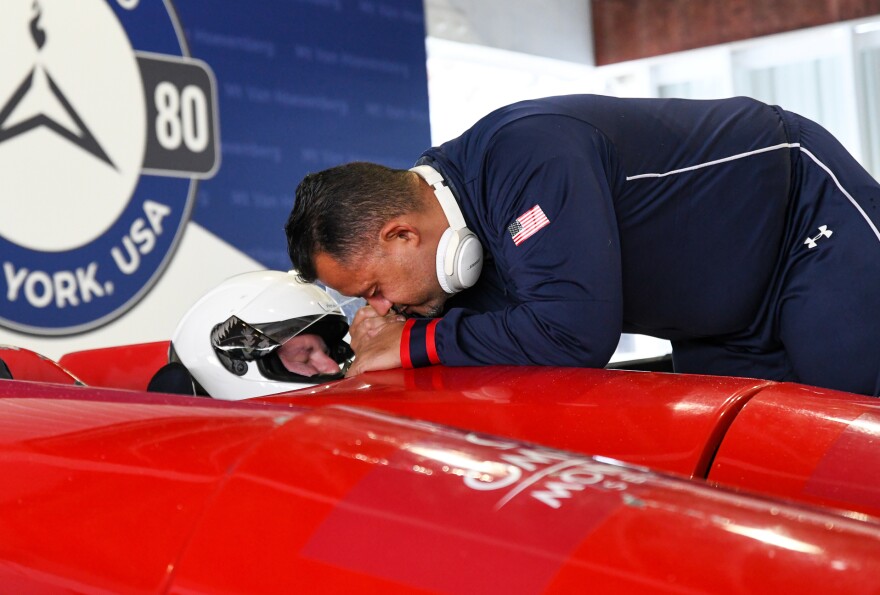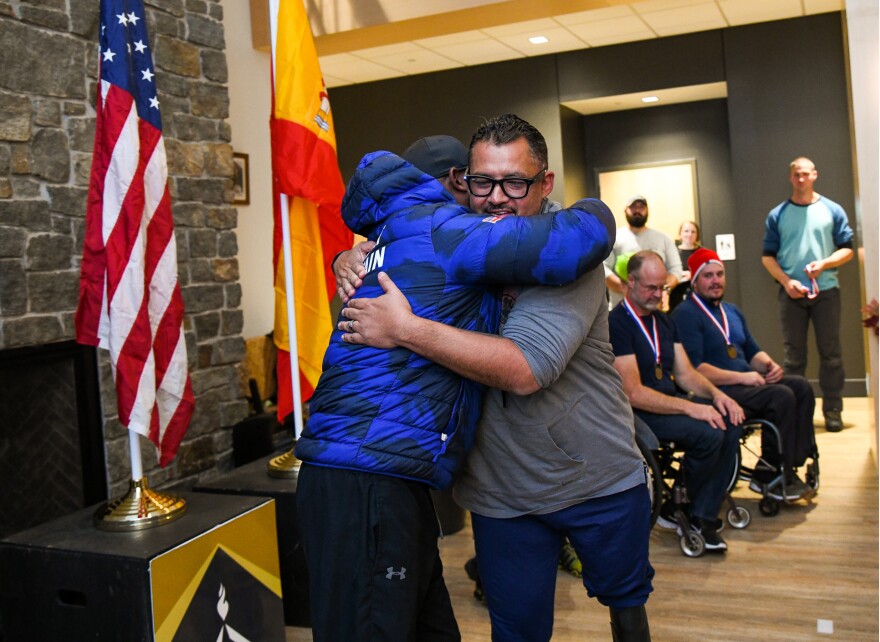LAKE PLACID, N.Y. — Will Castillo rubs sandpaper along the shiny steel runners on his bobsled at the top of a mountain in Lake Placid, N.Y.
"We're polishing the runners to make them go faster," he says. "Any little bit of friction will slow you down. When you're trying to race by hundredths of a second, you try to go as smooth as possible."
Friction would be a mild word for what Castillo has dealt with as part of a movement to get para-bobsled accepted as an official sport in the Paralympic Games. His own journey started in Iraq. On his second Army deployment in 2007 a bomb attack took his left leg to above the knee and killed everyone else in his truck. His transition back to civilian life wasn't easy.
"I wasn't doing anything with my life, to be honest with you. I was going through transition problems," he says. "The leg never really affected me, but losing my gunner and driver was really my biggest injury."
That survivor's guilt left Castillo depressed – for a while he fell into substance abuse. Then a friend connected him with the fledgling U.S. parabobsled team – and he found a new mission. After a few rough runs.
"Plenty of blood on the ice," says Castillo, of his first attempts in 2017 at skeleton – that's the sled the size of a cafeteria tray that riders lie on head first.


"I really smashed into the walls, and the worst ones I crashed and the sled was behind me and then I tried to sit on it and just try to get out of its way. But you know, we have good medics here and they always take care of us."
"There's no beginner slope in bobsled," says Kim Seevers, who now heads the USA Para Sliding Committee.
Seevers has been to the Paralympics as a guide for a visually impaired skier. She had been looking to expand the number of sports funded by the Department of Veterans Affairs, and bobsled fit the bill. She just had to persuade one of the three bobsled courses in North America to let her try.
"I tried to ... come up to Lake Placid and then try to convince them that allowing people with disabilities to slide in the track would be a great idea," says Seevers.
At first, the management there was nervous about a week-long camp for disabled athletes sliding at 60-plus miles per hour, says Seevers. But they came around.
"At the end of the week, he actually walked up to me and ... he said, 'What do I have to do to make Lake Placid the home of Paralympic Bob Sledding?' " says Seevers.

There was more friction to overcome. Apart from safety concerns, to get a new sport accepted into the Paralympics there have to be enough athletes competing at a high level around the world. Races must be held on three continents, and there needs to be a World Cup and a world championship.
Maybe the trickiest part: the same core countries must attend each qualifying event.
"There are times when we've just almost begged athletes — like, you've got to come to this race, we have to have your country. You know, we have to have you there," says Seevers.
The teams can send novice athletes though. Two of Spain's competitors in the 2022 World Cup at Lake Placid on Nov. 19-20 are new to the sport


"This is the first time in my life," said Miguel Angel Rebouras. His teammate Maria de la Merce Ibañez adds, "This is my third day – or is it the fourth?"
Ibañez and Rebouras spoke from the back of a box truck that served as a ski-lift, clinging to a strap in their wheelchairs. Volunteers, some of them former Olympians, were taking the team on a walk-thru down the mile long bobsled run. The guides wore ice cleats and kept the wheelchairs from slipping with climbing ropes.
Even standing still on the ice, a bobsled run is terrifying — steep, and winding, with paint marks on the ceiling from where the sleds hit at speeds from 60 to 90 miles per hour.
But Castillo says bobsled is a mental sport.
"You're 20 feet up on the wall and you're sideways, and as you're coming down to the curve, everything is just closing in around you," Castillo says.
"You gotta be patient and you gotta stay on that curve as long as you can. Cuz if you come off too soon, that pressure's gonna pick you up and flip you. You really have to be patient as you see the whole world caving in around you, you know the sled's going to come through," he says.


The North American World Cup almost didn't happen this year — after all the logistical and bureaucratic challenges, coping with pandemic complications and taking pains for a safe race, there was another source of friction no one saw coming: the Russian invasion of Ukraine in February.
Despite Russia's pariah status, over the summer the International Bobsled Skeleton Federation appointed a Russian official to the parasport committee. The rest of the committee protested, and by October they had all resigned. With the last-minute shortage of officials, Canada suddenly couldn't host the World Cup planned for Whistler in November 2022. Seevers learned about it days before her flight to Canada.
"I was sitting in my living room watching a football game, and my WhatsApp dinged," says Seevers, "I looked at it and was [Spanish star para-bobsledder Israel Blanco]. He said Whistler's canceled."
Seevers still needed a World Cup in North America to keep the application for Paralympic status alive.
"So I went on a massive recruiting effort to get enough volunteers here to help with sled-moving and figuring out all the pieces and the parts and how and if we could get them together to hold a safe race," says Seevers.
One of the volunteers she called was D.J. Skelton – also a disabled combat veteran, wounded in Iraq in November 2004. Skelton also has a background in adaptive sports, and he's relishing the chance to broaden the sports played at the Paralympics.


"This really is part of something that's making history and adding another opportunity for Americans and other people from their own countries that want to represent in this sport on the on the global stage. And go home with bronze silver and gold," says Skelton.
Skelton is learning bobsled himself . He says the intense concentration required for the one-minute long race is a sort of meditation.
"When I'm trying to figure out how to live with trauma from war, and there's all these triggers in your life ... how do you calm yourself instantly and just remain in the moment so you don't react to the emotion?" says Skelton.
"That's what I've been attracted to ... how impressed I am with those that do this, is how they've managed the chaos in their life, how they've managed the intensity of emotions in their life, to be able to just concentrate and put themselves in the moment with zero distractions," says Skelton.
Seevers and her army of volunteers somehow managed to assemble a World Cup in Lake Placid instead of Whistler. Some of the athletes had already flown to Canada, others flew directly to New York.


"You know, after Whistler was canceled, they could have all packed up and gone home, but they didn't. They came here, to participate and keep the dream alive," she says.
That dream of having bobsled into the Paralympics — Seevers doesn't think it'll happen until maybe the 2030 Olympics. She's grateful that these athletes are doing this, even though they may not make it to those games.
Castillo says other disabled athletes will get there if he doesn't.
"I'm just a Queens kid from Queens," he says. "I joined right after 9/11. I never thought that God would bring me here. So to be able to represent my country once again on the biggest stage, I mean that to me would be everything in the world. Games or not games, it's just to represent my country again, and to go out there and be disciplined at something and achieve my own goals."
Castillo took gold in his first race in the Para Boblsed World Cup in Lake Placid. In the second race, Spain's Israel Blanco beat him by less than four-tenths of a second. They'll face off again at the next event in Innsbruck, Austria, in January.
It could be quite a battle. Castillo is now ranked No. 1 in the world.
Copyright 2023 NPR. To see more, visit https://www.npr.org.





